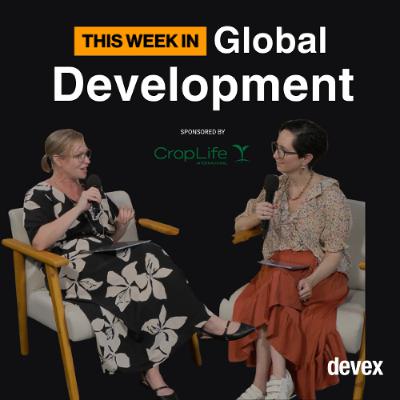Discover Devex Podcasts
Devex Podcasts

289 Episodes
Reverse
In our final episode of 2025, we discuss a tumultuous year in U.S. foreign assistance. It has not always been clear who is calling the shots in the new world of U.S. development funding, but we break down who we believe are the key players in this moment of uncertainty.
We are also seeing that the State Department is rebuilding its workforce, and across the world, positions are opening up to fill the gaps created by the obliteration of the U.S. Agency for International Development. It’s all part of a messy scramble to reassemble the staff needed to oversee billions in foreign aid — and the first visible sign of a system trying to piece itself back together.
To piece together these emerging clues about the future, Business Editor David Ainsworth sits down with Senior Reporter Michael Igoe and Global Development Reporter Elissa Miolene for the latest episode of our weekly podcast series.
During the sponsored segment of This Week in Global Development, Devex's Kate Warren speaks with Terre des Hommes Netherlands' Asia regional director about the organization's commitment to creating systemic change to address the root causes of child exploitation, as well as the importance of a multi-stakeholder protection ecosystem.
Sign up to the Devex Newswire and our other newsletters:
https://www.devex.com/account/newsletters
The U.S. State Department has signed a bilateral agreement with Kenya, its first in its ongoing efforts to overhaul how it provides global health assistance. The United States said it will invest up to $1.6 billion over five years in the East African country, with the Kenyan government cofinancing the agreement with $850 million. We take a look at how this controversial new approach could play out in practice, and how it could shape other agreements between the U.S. and other African states.
On the topic of Kenya, we also dig into the Kenyan government’s debt-for-food swap deal with the U.S. International Development Finance Corporation, worth $1 billion. The innovative arrangement allows the country to reduce part of its external debt in exchange for redirecting the savings into food security programs.
The State Department has decided to cut funding to organizations implementing programs to build resilience in chronically food-insecure regions, which will affect the budget of the U.S. government’s Food for Peace initiative. We explore the move’s implications, including the impact on U.S. farmers.
For a deep dive into these stories and others, Senior Editor Rumbi Chakamba sits down with Senior Reporter Sara Jerving and Global Development Reporter Ayenat Mersie for the latest episode of our weekly podcast series.
To mark Human Rights Day, Amazon’s director of human rights and social impact talks about Amazon’s human rights work, the systemic challenges facing global supply chains, and the role of responsible innovation in addressing them in the sponsored segment of the discussion.
Sign up to the Devex Newswire and our other newsletters:
https://www.devex.com/account/newsletters
We dig into the details of a new report published by UNAIDS, which found that donor funding cuts to the HIV response could lead to an additional 3.9 million new infections over the next five years, even if treatment coverage is maintained. The report, published on World AIDS Day 2025, called on governments to uphold human rights and urged funders to dedicate more resources to HIV prevention, including the highly effective twice-yearly injectable, lenacapavir.
Last week, the U.S. State Department announced a grant of up to $150 million to drone company Zipline to expand health supply operations in five African countries. We highlight how this decision could signal the Trump administration’s new approach to global health aid.
We also unpack how digital public infrastructure, or DPI, is becoming a vital development tool, and contemplate whether it can offer a more collaborative, cost-effective approach, especially given the recent cuts to foreign assistance.
To explore these stories, and others, Senior Reporter Adva Saldinger sits down with Senior Editor for Special Coverage Catherine Cheney and Senior Reporter Jenny Lei Ravelo to discuss the top global development stories of the week.
During the sponsored segment of This week in global development, brought to you by Pivotal, Catherine sits down with Action for Women’s Health grantee Lisel Lifshitz Gudiño, who is also the executive director of Mujeres Aliadas. Her leadership champions the midwifery practice, ensuring the delivery of safe, dignified, and culturally sensitive health care. Learn more about the awardees and explore the content series:
https://pages.devex.com/boldideas.html
Sign up to the Devex Newswire and our other newsletters:
https://www.devex.com/account/newsletters
This week, we unpack the major storylines emerging from the G20 Summit — the first ever held on African soil — where South Africa used its presidency to spotlight debt, inequality, climate, and critical minerals, even as the United States chose not to attend. With global development at an inflection point, leaders leaned into questions of how multilateralism must evolve as the global south asserts greater influence.
With the humanitarian system stretched thin and displacement at record highs, we also examine the race to lead the UN Refugee Agency. A crowded field — largely European, with one notable African contender — is competing to guide the agency through a period of severe funding constraints and rising political pressures.
During the conversation, we dig into what South Africa’s G20 agenda signals for future global cooperation, what’s at stake in the UNHCR leadership contest, and how shifting power dynamics could reshape the development landscape in the years ahead.
To break down these stories and more, Devex Business Editor David Ainsworth sits down with colleagues Elissa Miolene and Colum Lynch for the latest episode of our weekly podcast series.
Sign up to the Devex Newswire and our other newsletters.:
https://www.devex.com/account/newsletters
This week, we take a look at the details of the new template for bilateral agreements between the United States and partner governments, which sheds light on the ideas floating around the Trump administration on how it will engage with other countries when it comes to global health. However, experts are raising concerns around its implementation.
In our update from COP30, we discuss the conference’s most important highlights, including the latest commitments and progress on scaling climate finance. We also investigate whether the meeting is living up to its designation as the “Implementation COP.”
To dig into these stories, Devex Senior Editor Rumbi Chakamba sits down with Senior Reporter Sara Jerving and Global Development Reporter Ayenat Mersie, who is on the ground at COP30, for the latest episode of our weekly podcast series.
During the sponsored segment of This Week in Global Development, brought to you by Pivotal, Kate Warren sits down with Action for Women’s Health grantees Sabine Zink Bolonhini and Adriana Mallet Toueg, co-founders of SAS Brasil, whose leadership brings equity in healthcare by leveraging innovative solutions in access and care delivery. Learn more about the awardees.
Sign up to the Devex Newswire and our other newsletters:
https://www.devex.com/account/newsletters
Special episode: Can AI support mental health? by Devex
This week we are on the ground at the 30th United Nations Climate Change Conference, or COP30, in Belém, Brazil, where the intense heat and daily thunderstorms offer an “immersive experience” of the climate crisis right at the conference’s doorstep.
In this episode, hosted by Devex Executive Vice President and Executive Editor Kate Warren, reporters Ayenat Mersie and Jesse Chase-Lubitz highlight the key talking points at the conference, including the latest on the loss and damage fund and how multilateral development banks are financing climate action.
We also decipher the jargon around climate action for our global development audience, breaking down key acronyms such as NDCs and the controversial new investment fund, TFFF.
We also decipher the jargon around climate action for our global development audience, breaking down key acronyms such as NDCs and the controversial new investment fund, TFFF.
The sponsored segment of the conversation is brought to you by Pivotal and its Action for Women’s Health initiative to discuss innovations shaping the future of women’s health.
In this episode, Devex Senior Editor Catherine Cheney sits down with recently awarded grantee, Serah Joy Malaba, co-CEO of Tiko, whose leadership is deeply rooted in personal experience, fueling her commitment to ensure girls have the best chance for success. Learn more about the awardees and explore the content series — starting at the 12:37 mark.
Sign up to the Devex Newswire and our other newsletters:
https://www.devex.com/account/newsletters
In this week’s special episode of the This week in global development podcast, filmed at COP30 in Belém, Brazil, and hosted in partnership with CropLife International, we explore the expanding role of agricultural innovation — including advances in plant science, crop protection, biotechnology, and digital and precision tools — in helping farmers adapt to climate stress and maintain productivity.
Devex Executive Editor Kate Warren speaks with Laurie Goodwin, vice president of public affairs and communications at CropLife International, about how innovation and open trade can work together to build climate-resilient food systems.
The episode also introduces a new practical guide that compiles global examples of policy approaches that strengthen sustainable agricultural growth and support climate, productivity, and resilience goals. Across the discussion, the importance of collaboration among governments, the private sector, and farmers is emphasized as essential for delivering measurable on-the-ground outcomes — not only at COP30, but across the wider set of global forums connecting climate, trade, and food security agendas.
To hear more, listen to this conversation with Laurie Goodwin on this special podcast episode of This Week in Global Development.
On the sidelines of the World Economic Forum’s Humanitarian and Resilience Investing Initiative’s Frontier Markets Impact Meeting in Geneva, Devex teamed up with Radio Davos for a special podcast episode. The conversation was cohosted by Devex President and Editor-in-Chief Raj Kumar and Radio Davos host Robin Pomeroy.
Driven by shrinking government aid and escalating global needs, the global development sector is facing serious financing headwinds — a financial shock wave comparable to the 2008 crisis.
These changes are fundamentally altering the global development architecture, forcing a pivot away from reliance on official development assistance.
To maintain progress, the discussion highlighted the crucial need to mobilize private capital and build trust-based, sustainable financial systems.
To explore these critical shifts, they sat down with Carla Haddad Mardini, director of UNICEF's private fundraising and partnerships, and Julienne Oyler, CEO of Inkomoko.
Sign up to the Devex Newswire and our other newsletters:
https://www.devex.com/account/newsletters
This week, we reported that U.S.-based international nonprofits are looking into registering sister organizations overseas as they face an increasingly unpredictable political environment at home. Law firms in Canada and the United Kingdom confirm this trend, telling Devex they’ve seen increased interest from U.S. entities seeking to set up international arms amid growing domestic instability.
With authoritarian practices on the rise and civic spaces closing, we reflect on the key takeaways from the Trust Conference in London, where the international community gathered to learn from each other’s lessons when it comes to fighting autocracy.
We also look ahead to the Second World Summit for Social Development 2025 and examine what its core themes and expected outcomes mean for the global development agenda.
To explore these stories, and others, Senior Editor Rumbi Chakamba sits down with Managing Editor Anna Gawel and Global Development Reporter Elissa Miolene for the latest episode of our weekly podcast series.
Sign up to the Devex Newswire and our other newsletters:
https://www.devex.com/account/newsletters
Special episode: Pivotal Ventures on Funding the Future of Women’s Health by Devex
This week, we explore the ins and outs of UN80, the United Nations' reform plan to cut costs and boost efficiency. We outline what this initiative, drafted as a result of funding cuts to the institution, involves in practice.
On the topic of foreign aid cuts, we have also been following the calls for philanthropy to fill the void left by traditional donors, most notably the United States. We discuss that while some foundations, such as the Children’s Investment Fund Foundation, are halting U.S. funding over policy uncertainty, we are also witnessing lifesaving programs continuing to operate thanks to philanthropy organizations stepping up their funding.
In order to dig into these stories, and others, Business Editor David Ainsworth sits down with Senior Global Reporter Colum Lynch and Senior Editor for Special Coverage Catherine Cheney for the latest episode of our weekly podcast series.
Sign up to the Devex Newswire and our other newsletters:
https://www.devex.com/account/newsletters
This week, we are on the ground at the World Bank-International Monetary Fund annual meetings, closely following the conversations that will shape the global development sector.
As we note a reduced focus on climate change policy compared to previous years, we are tracking how the conversation is pivoting, with climate issues now being approached through an energy security angle.
In addition to examining the World Bank’s ongoing focus on global job creation, we highlight our exclusive on-the-sidelines interview at Devex Impact House with U.S. Rep. French Hill, a Republican from Arkansas, who shared insights on the Trump administration’s “America First” approach to foreign assistance, providing a Republican perspective on U.S. engagement in global development.
In order to discuss the key talking points at the annual meetings, Devex’s Adva Saldinger sits down with Michael Igoe and Elissa Miolene for the latest episode of our podcast series, recorded live at Devex Impact House on the sidelines of the main summit.
Sign up to the Devex Newswire and our other newsletters:
https://www.devex.com/account/newsletters
Special episode: A conversation with the Mines Advisory Group by Devex
This week on the podcast, we unpack what to watch during the World Bank and International Monetary Fund annual meetings in Washington, D.C. — from shifting global growth forecasts to reforms across multilateral development banks. As the fall meetings kick off, leaders in development finance are looking closely at how the World Bank is reshaping itself to mobilize more private capital and move faster on project approvals.
Amid ongoing reforms, attention is turning to how new tools such as securitizations and guarantee instruments can attract institutional investors while balancing the needs of borrowing countries. The conversation also explores the ways investors are seeking to value ecosystems alongside traditional climate assets, and how differences between U.S. and European markets are shaping approaches to ESG, or environmental, social, and governance, and climate investment.
To discuss these developments, Senior Reporter Adva Saldinger sits down with Elissa Miolene and J.P. Morgan’s Faheen Allibhoy for the latest episode of This Week in Global Development.
Sign up to the Devex Newswire and our other newsletters:
https://www.devex.com/account/newsletters
This week, we discuss the details of the “Accra Reset,” an effort to declare an end to the era of development-as-usual and to push for the creation of new governance, business, and financing models. With traditional donors cutting foreign assistance, African nations and others are using the initiative to jointly invest, design, and create solutions with external partners.
With official development assistance plummeting, governments are under pressure to make up their global health funding shortfall through taxes on tobacco, alcohol, and sugary beverages. However, these levies may not be a financial panacea.
During the conversation, we also look back at how U.S. objections stalled the long-negotiated United Nations declaration on noncommunicable diseases, sending it to a full General Assembly vote this month, and look ahead to the World Health Summit.
To dig into these stories and others, Senior Editor Rumbi Chakamba sits down with Senior Reporter Sara Jerving and contributing reporter Andrew Green for the latest episode of our weekly podcast series.
Sign up to the Devex Newswire and our other newsletters:
https://www.devex.com/account/newsletters
This week we are on the ground in New York to cover the 80th United Nations General Assembly and Climate Week.
Our discussion breaks down President Donald Trump’s address at the summit, where he called climate change a hoax, denounced Europe’s energy policies, and focused on the urgent need to address uncontrolled migration.
The global drive for emissions reduction is moving forward despite the Trump administration's stance on climate action, with high emitters, including China, submitting their Nationally Determined Contributions, or their climate action plans to keep global warming below 1.5 degrees Celsius.
To dig into these stories and catch up on what’s happening at UNGA80, senior editor Rumbi Chakamba sits down with senior global reporter Colum Lynch and global development reporter Jesse Chase-Lubitz for the latest episode of our weekly podcast series.
Note on episode: David Lammy’s current title is deputy prime minister, not prime minister as mentioned in the episode.
Sign up to the Devex Newswire and our other newsletters:
https://www.devex.com/account/newsletters
This week, the Devex team is on the ground at the 80th United Nations General Assembly in New York. On the sidelines of the high-level talks, we are hosting a series of events with some of the most influential voices in global development at our dedicated venue, Devex Impact House.
From the future of foreign assistance to the latest plan to reform the U.N., we discuss the forces shaping the sector and defining a new era of global development. This comes amid President Donald Trump's plans to reshape the international system, with a clear focus on reducing foreign aid and challenging long-standing international norms.
With the U.S. appearing to retreat from the U.N., we explore who the contenders are to fill the gap left by the world’s largest economy.
To explore the key conversations we are following at UNGA, Senior Editor Rumbi Chakamba sits down with Senior Global Reporter Colum Lynch, as well as Devex President and Editor-in-Chief Raj Kumar, for this special episode of our weekly podcast series.
Sign up to the Devex Newswire and our other newsletters:
https://www.devex.com/account/newsletters
This week, we take a look at the key talking points ahead of the high-level meetings of the 80th session of the United Nations General Assembly. From the Trump administration’s cutting of funding to international organizations to China’s desire to increase its influence at the U.N., we discuss the conversations that we will be following that are most relevant to the global development community.
During the discussion, we also explored some of the conversations that may not get the attention they deserve, including reforming the global debt architecture and securing the future of humanitarian funding.
To look ahead to UNGA 80, Devex Business Editor David Ainsworth sits down with Senior Global Reporter Colum Lynch and Allison Lombardo, former deputy assistant secretary at the State Department, for the latest episode of our weekly podcast series.
Together, they break down the diplomatic challenges and highlight negotiations that will shape this year’s discussions.
Sign up to the Devex Newswire and our other newsletters:
https://www.devex.com/account/newsletters
This week, we were at the Africa Climate Summit in Addis Ababa, Ethiopia, closely following the stories that matter most to the global development community. From forging a unified voice ahead of the 30th United Nations Climate Change Conference to how carbon markets could transform climate action on the continent, we discuss the key takeaways from the conference.
In the United States, we continue to follow a key lawsuit challenging the Trump administration's foreign aid spending — or lack thereof. The case, which is a test of the executive branch's power over government spending, is now headed to the Supreme Court. The administration asked the highest court to intervene after a lower court compelled it to spend foreign assistance funds that Congress had already appropriated. We take a look at where the case stands and what might happen next.
To dig into these stories and others, Senior Reporter Adva Saldinger sits down with Managing Editor Anna Gawel and Global Development Reporter Ayenat Mersie for the latest episode of our weekly podcast series.
Sign up for Devex Newswire and our other newsletters: https://www.devex.com/account/newsletters









